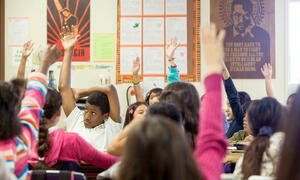A Museum. A Memorial. A Message.



This election season, we ground ourselves in supporting the work to increase power and capacity for a multiracial, inclusive democracy in the South and across our nation. In our Fall 2023 magazine, Angela Glover Blackwell, founder in residence of PolicyLink, and Margaret Huang, CEO and president of the Southern Poverty Law Center, shared their thoughts on the transformational possibilities of that democracy.
Before the new school year begins, let’s consider the ways that we can come together in our communities to nurture all our children. The proverb “It takes a village to raise a child” reminds us that parents and caregivers, families, educators and community members are all essential in children’s support ecosystem. Parents and caregivers are children’s first teachers and play a significant role in shaping their perspectives.